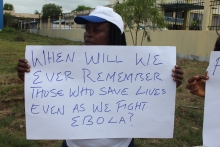Trade union Ebola response strategy

In order to support its affiliates and bring the political nature of the problem to the forefront, PSI and its affiliates in the region, united in WAHSUN, the West-African Health Sector Unions Network, launched together the Ebola Response Strategy aimed at empowering unions through research, capacity building and exchange between unions, so they can play an active role in the decision-making processes and advocate quality public health systems including better working conditions for healthcare workers, universal health coverage and social security systems. PSI is working with a variety of civil society actors who share similar views and thus creating a large network of support.
The different pillars of the Strategy
Research and exchange
Unions inside WAHSUN are exchanging information and lessons learned, not only on dealing with Ebola, but also on the elaboration of social security systems and universal healthcare. An important aspect in this is the development of fair taxation systems. Tax evasion and tax avoidance currently drain billions in resources out of Africa, money that states need to increase their budgets and finance the development of strong public social services and public social security systems.
Respect for union rights and Social Dialogue
It was in fact health workers themselves who raised the issue of Ebola early in 2014 – yet these voices were not heard primarily because of the lack of a functioning structure for dialogue in the countries themselves. Numerous examples show that strong social dialogue can effectively make a difference. In Nigeria, unions gave early warnings and ultimately government and healthcare unions worked closely together to successfully stop the spread of the disease. In Sierra Leone and Guinea however, social dialogue is weak, whereas in Liberia, trade unions in the public sector remain illegal and are not recognized. Getting healthcare workers involved in the recovery process will be the greatest challenge of the trade union strategy.
Outreach
Various civil society organisations and NGOs are aware of the importance of quality public services and mechanisms for participation in a democracy. The creation of a large platform of likeminded organisations will make our demands and opinions widely supported. United we will have a stronger voice in the debate.
Lobby
The unions will lobby national governments, regional and international institutions, donors, etc., to explain their positions, clarify the difficulties that are experienced by the healthcare workers, the structural problems in the healthcare systems and the possible solutions and alternatives.
Communication
Our trade union strategy wants to give a voice to healthcare workers. They will tell their story, testify about the difficulties they encounter while trying to do their job and give their suggestions for solutions.
-
Read the publication on-line
-
Download a PDF of "PSI's Trade Union Response to the Ebola Virus Disease"
-
More on the PSI's Ebola response
-
Also see PSI's work on Health and Social care services
In this issue:
- Foreword: PSI Health Priorities and Trade Union Response to the Ebola Virus Disease
- A global view on the impact of Ebola
- Trade union response: the ebola response strategy
- Work on the ground: three national action plans
- The survey: mapping missing wages, hazard fees and family support
- Lobby: visits in the three most affected countries and the United States
- Liberia: trade union rights under attack
- Congo: unite the unions
- Ghana: unions involved

